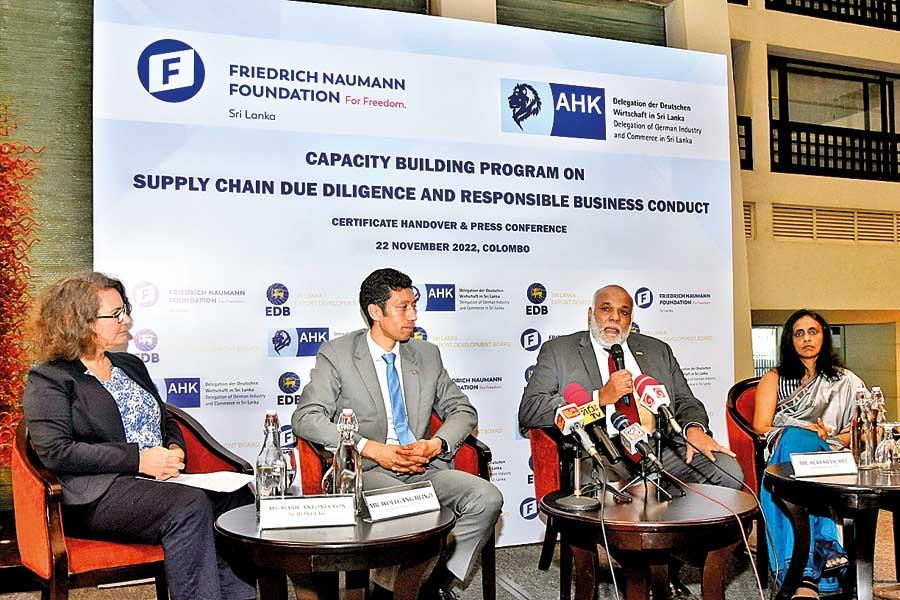23 Nov 2022 - {{hitsCtrl.values.hits}}

From left: AHK Sri Lanka Chief Delegate Marie Antonia von Schönburg, Friedrich Naumann Foundation for Freedom Sri Lanka and Bangladesh Head Wolfgang Heinze, EDB Chairman and Chief Executive Suresh de Mel and EDB Director Export Services Indumini Kodikara
Pic by Nimalsiri Edirisinghe
The German Act on Corporate Due Diligence Obligations in Supply Chains, which comes into force from January 1, 2023, presents an excellent opportunity for Sri Lankan exporters to strengthen and showcase their high sustainability standards while increasing high value-added exports, according
to experts. “The Supply Chain Due Diligence Act is an excellent opportunity for the export sector to strengthen and showcase their high standards.
In the context of worldwide diversification of supply chains, the current effort by Sri Lankan exporters would strengthen the national economy through higher exports to Germany, Europe and beyond,” Friedrich Naumann Foundation Sri Lanka and Bangladesh Head Wolfgang Heinz remarked.
He made these remarks in taking part in a press conference yesterday in Colombo, which was organised to award certifications to 26 Export Development Board (EDB) officials, who completed a capacity building programme in preparation for the forthcoming German Act on Corporate Due Diligence in Supply Chains. The capacity building programme was jointly organised by the Delegation of German Industry and Commerce (AHK) in Sri Lanka and Friedrich Naumann Foundation for Freedom (FNF). The German Act on Corporate Due Diligence Obligations in Supply Chains is an effort on the part of the German Federal Government to protect human rights and manage material environmental risks through supply chains of companies operating in Germany. The act in 2023 requires all companies operating in Germany, with 3,000 or more employees, to implement a supplier risk management system and in 2024, the act will apply to companies operating with 1,000 or more employees. The risk management system would support efforts to assess, mitigate and monitor human rights and environmental risks in the company’s supply chain. “The implications of the German Supply Chain Due Diligence Act are to ensure free and fair trade.
This includes transparent value chains, sensible trade agreements that enable lasting good economic relations, the observance of fundamental human rights and international conventions in commerce and the guarantee of economic standards across value chains when doing business with Germany,” AHK Sri Lanka Chief Delegate Marie Antonia von Schönburg said. She noted that the European Union (EU) has a similar or much more sophisticated legislation in the making that may come to fruition in 2024. Therefore, she said that compliance with the German Supply Chain Due Diligence Act would prepare Sri Lankan exporters to comply with the upcoming EU legislation. Currently, the majority of the large-scale exporters have already taken measures to comply with the German Supply Chain Due Diligence Act. Commenting on preparing and getting the SME exporters to comply with the law, EDB Chairman and Chief Executive Officer Suresh de Mel noted that the EDB has planned a series of awareness sessions targeting SME exporters to provide the necessary guidance on compliance requirements with the new act.Further, de Mel also viewed this legislation as an opportunity for Sri Lankan exporters to increase exports, in particular value-added food exports, to Germany and other premier markets. The German enterprises failing to comply with legal obligations with regard to supply chains are set to face administrative fines up to eight million euros or up to 2 percent of annual global turnover. This is also the first time the responsibility of German enterprises to respect human rights in global supply chains has been put on a legal footing.
Currently, the EU is Sri Lanka’s second largest export region, with Germany remaining as the fourth largest export destination for the country’s exports.
06 Nov 2024 1 hours ago
06 Nov 2024 1 hours ago
06 Nov 2024 3 hours ago
06 Nov 2024 4 hours ago
05 Nov 2024 05 Nov 2024